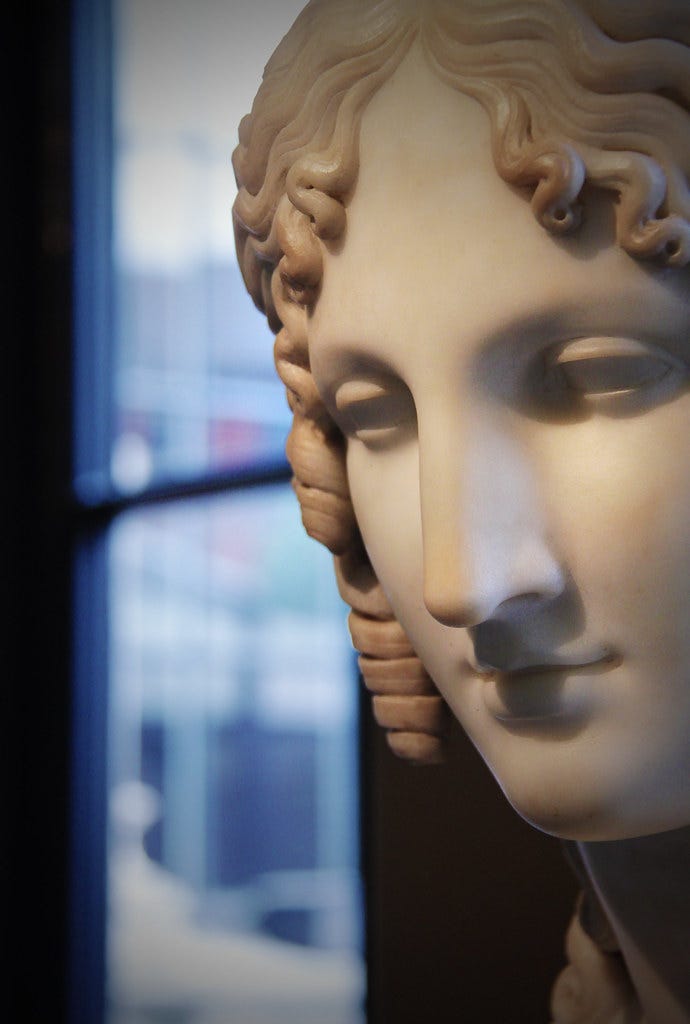Who Was Helen of Sparta?
Understanding the Bronze Age Queen for International Women’s Day.
Dear Classical Wisdom Member,
I love it when a plan comes together.
One of my all time favorite Classical Wisdom writers, Mary Naples, emailed me last week with this piece. Let me know what you think of Helen, she casually mentioned...
I was immediately enthralled!
Mary is quite the expert on Bronze Age women (in fact, we’ve been working hard to publish her book on the subject - an ebook version will be available exclusively for members next month!) and so her insights on Helen, the beautiful Spartan Queen usually associated with the fall of Troy, were astounding. To understand her role and importance in the mythic tale is nothing short of grasping a fundamental element of Homer’s epics (indeed, both the Iliad and the Odyssey!) as well as the surprisingly powerful role of women in the ancient world.
And then when I realized (I’ll admit, yesterday), that I was going to publish Mary’s excellent piece on International Women’s Day... well, it seemed as if it was an arrangement made by Hera herself!
But before we delve into how Helen shaped history, two very important news for our Members.
First, please remember that our Roundtable Discussion with author of the Bronze Lie, Myke Cole, will take place next Thursday, March 16th. He has supplied a chapter to discuss whether the idea of the supreme Spartan Warrior was a lie and for whom it benefited...
Members can access the book, as well as the zoom link to join, here:
Second, we will have a very big announcement in the next few days! It’s extremely exciting and involves the wine dark seas... as well as the “stepping stones of culture”. Make sure to keep a lookout... time is of the essence.
Now, onto the lady of the hour, “the face that launched a thousand ships and burnt the topless towers of Ilium,” Helen.
All the best,
Anya Leonard
Founder and Director
Classical Wisdom
The Bronze Age Queen—Helen of Sparta
By Mary Naples
Celebrated as the most beautiful woman in the world, the allure of Helen of Troy née Sparta was the yardstick for which all women were measured—-and found inadequate. Her scandalous abduction by Paris from her Spartan home triggered a ten-year-long siege on Troy which was responsible for the countless deaths of Trojans and Greeks alike.
Yet despite the abysmal carnage for which she was largely held culpable, Helen escaped Troy without a hair out of place. In one tradition Helen winds up in Egypt after the war, but if Herodotus is to be believed, she spent the entire time there. Doubtless, the Greeks were unduly obsessed with a heroine they loved to hate and have the stories to show for it.
Unsurprisingly, most of the myths which encircle this fairest of all women, involve rape. Helen herself was the product of the rape by Zeus almighty, king of the gods, of the lovely Leda, queen of Sparta. While Leda was sunbathing on the banks of the River Eurotas, an enamored Zeus turned himself into a magisterial swan and had his way with her. As a daughter of the almighty Zeus, it is no small wonder that Helen was radiant. By some accounts, at the tender age of seven Helen was then kidnapped or raped by Theseus, the mythological first king of Athens. Theseus, like Zeus before him, was accustomed to defiling the gentler sex but a romantic interest in another daughter of Zeus—Persephone herself—-would soon lead him astray. Ultimately, Helen’s twin brothers—Castor and Pollux— restored her to their Spartan home.
All the same, Helen the “richly tressed” Spartan queen is best known for fleeing with Paris to Troy after his “diplomatic” visit to Sparta. But a question that has plagued many throughout the ages is did she elope with the flamboyantly handsome Prince Paris of her own volition? And what role, if any, did the goddess of love, Aphrodite, play in her kidnapping?
Finally, could the kidnapping of a queen—even one as dazzling as Helen— have been the sole reason behind a ten-year-long war between East and West?

Recognized throughout the ages as Helen of Troy, she had always been Helen of Sparta to the Greeks. Indeed, it must have come as no surprise to them that the face which launched a thousand ships was of Spartan origin. Spartan women were renowned not only for their beauty but notorious for being loose with their virtue as well. In a city-state that encouraged its citizen-wives to engage in marital infidelity, it is no wonder that they should be considered wanton by other Greeks. Doubtless, Helen as an unchaste foremother was an unequivocal role model who was even worshiped as a deity in her native home.
Helen hailed from the late Bronze age kingdom of Sparta. A gold-glittering powerhouse, the Mycenaean civilization preceded ancient Greece by several hundred years when these fierce seafaring warriors—known as the first Greeks— conquered the Greek peninsula from its earlier inhabitants in the sixteenth century BCE.
Keep reading with a 7-day free trial
Subscribe to Classical Wisdom to keep reading this post and get 7 days of free access to the full post archives.





